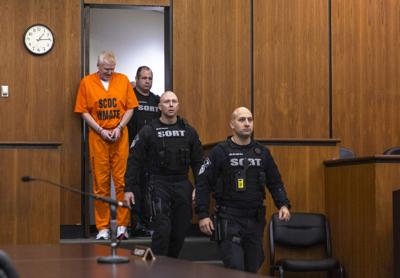Disbarred attorney and convicted murderer Alex Murdaugh is not telling the truth about his missing assets or of everyone who may have helped him steal millions, federal prosecutors say, revealing they believe yet another lawyer may have played a role in his schemes.
In a series of motions filed March 26, prosecutors acknowledged that a federal grand jury was still investigating the Murdaugh case. And they said that after four meetings with Murdaugh last year, they didn’t believe he was being completely truthful about some $6 million they can’t account for.
So under the terms of his agreement to plead guilty to nearly two dozen federal charges, the U.S. Attorney’s Office decided to subject him to a polygraph test. An FBI examiner asked him about the missing money and “the involvement of another attorney in (his) criminal conduct.”
He did not pass. In fact, prosecutors said, “all of Murdaugh’s responses … indicated deception.”
The prosecution team, led by Assistant U.S. Attorney Emily Limehouse, disclosed the polygraph results in a motion to rip up their plea agreement with Murdaugh. Federal prosecutors had agreed that if Murdaugh cooperated, they would ask a judge to let him serve his federal and state sentences at the same time.
In addition to two life sentences for the June 2021 murders of his wife, Maggie, and son Paul, Murdaugh agreed a 27-year term in state prison related to his vast financial crimes. He pleaded guilty to stealing millions of dollars from clients, his law firm and others who trusted him, as well as money laundering and tax evasion.
The financial crime sentences will mean little unless Murdaugh’s murder convictions are overturned. (He is currently appealing the verdicts.) But if they are, stacking the state and federal prison terms could serve to provide additional insurance to prosecutors that he will not walk free any time soon.
U.S. District Judge Richard Gergel, who is scheduled to impose a federal sentence April 1, has indicated he may hand down an unusually stiff punishment. In an order this month, Gergel said he might consider a sentence longer than federal guidelines recommend.
Murdaugh defense attorney Dick Harpootlian declined to comment on the motions. Limehouse couldn't immediately be reached for comment.
Prosecutors indicated that Murdaugh had been forthright about some aspects of his financial crimes during their meetings.
He accepted responsibility for the crimes federal authorities accused him of, they said, and he discussed the involvement of two co-conspirators who have been convicted of federal crimes — former Hampton banker Russell Laffitte and now-disbarred Beaufort lawyer Cory Fleming. But they contend he wouldn’t reveal everything he knew.
They asked Gergel to let them keep secret the questions they asked Murdaugh. They say the polygraph questions would tip their hand in an ongoing investigation and identify potential witnesses and targets.
Law enforcement agencies at both the state and federal level use polygraph exams to assess whether suspects or witnesses are telling the truth. The machines measure physiological factors such as heart rate, blood pressure and respiration. But in most states, including South Carolina, they are not admissible as evidence in trials because they are not considered to be reliable enough. Some people can fail the tests while telling the truth and others can beat the test while lying.
In plea bargains, however, it is not uncommon for prosecutors to use polygraphs to assess the veracity of information the subject is providing.










